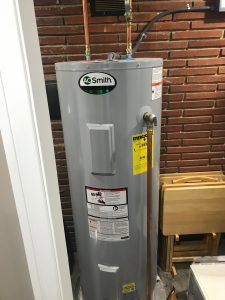Mastering The Identification Of Common Heater Issues
Mastering The Identification Of Common Heater Issues
Blog Article
Just about everyone seems to have their own individual rationale on the subject of Water Heaters Problems.

Picture beginning your day without your regular hot shower. That already establishes an inadequate tone for the rest of your day.
Every residence needs a trustworthy hot water heater, yet only a few understand exactly how to take care of one. One very easy way to keep your water heater in top form is to look for mistakes regularly and fix them as soon as they appear.
Remember to turn off your water heater before sniffing about for mistakes. These are the water heater mistakes you are most likely to encounter.
Water also warm or too chilly
Every hot water heater has a thermostat that figures out just how hot the water obtains. If the water coming into your house is as well warm in spite of setting a practical maximum temperature level, your thermostat might be malfunctioning.
On the other hand, too cold water may be due to a stopped working thermostat, a busted circuit, or inappropriate gas flow. For example, if you use a gas hot water heater with a busted pilot burner, you would obtain cold water, even if the thermostat is in best condition. For electric heaters, a blown fuse may be the perpetrator.
Inadequate hot water
Hot water heater can be found in several dimensions, depending upon your warm water needs. If you run out of warm water before every person has actually had a bath, your hot water heater is too little for your family size. You must think about installing a bigger hot water heater storage tank or choosing a tankless water heater, which uses up less room and also is much more resilient.
Odd sounds
There are at the very least 5 sort of noises you can speak with a hot water heater, yet the most common interpretation is that it's time for the water heater to retire.
Firstly, you need to know with the typical sounds a water heater makes. An electric heating system may appear different from a gas-powered one.
Popping or banging noises usually imply there is a slab of sediment in your storage tanks, and it's time to clean it out. On the other hand, whistling or hissing sounds may just be your valves letting some pressure off.
Water leaks
Leakages might originate from pipes, water connections, valves, or in the worst-case situation, the storage tank itself. Gradually, water will rust the tank, and find its escape. If this happens, you require to change your water heater immediately.
Nevertheless, before your adjustment your entire container, make certain that all pipes are in area which each shutoff functions perfectly. If you still require aid identifying a leak, call your plumber.
Rust-colored water
Rust-colored water means among your hot water heater components is corroded. It could be the anode pole, or the storage tank itself. Your plumber will certainly have the ability to identify which it is.
Warm water
Despite just how high you set the thermostat, you will not get any type of hot water out of a heating system well past its prime. A hot water heater's performance may minimize with time.
You will certainly likewise get lukewarm water if your pipes have a cross connection. This indicates that when you switch on a tap, warm water from the heating system streams in together with regular, cold water. A cross link is simple to spot. If your warm water faucets still follow shutting the hot water heater valves, you have a cross link.
Discoloured Water
Rust is a major source of filthy or discoloured water. Corrosion within the water storage tank or a failing anode pole could create this discolouration. The anode rod protects the storage tank from rusting on the within and must be checked yearly. Without a pole or a correctly operating anode pole, the warm water rapidly rusts inside the container. Contact an expert hot water heater technician to figure out if changing the anode pole will certainly fix the problem; otherwise, change your hot water heater.
Conclusion
Ideally, your water heater can last 10 years before you need a modification. However, after the 10-year mark, you may experience any of these mistakes more routinely. Now, you must include a new water heater to your budget.
How To Troubleshoot 3 Common Water Heater Problems in Twin Cities
The Water Heater Is Leaking
A leaky cold water inlet valve A loose pipe fitting A leaky temperature and pressure relief valve A corroded anode rod A cracked tank Turn Off Your Water Heater:
Shut off your gas water heater by turning the gas valve on the unit to the “OFF” position. Shut off your electric water by switching its power off at your electrical panel. Look for a two-pole breaker labeled “water heater” and turn it to the “OFF” position. Move the ball valve connected to the water heater to be perpendicular to the piping at a 90° angle. Look for the Leak:
Depending on whether the water is coming from the tank's top or bottom, you’ll want to look for the leak in different locations.
If the leak comes from the top of the tank, carefully look for water escaping from the cold water inlet valve or loose pipe fittings. Rusted hot and cold water valves can have loose connections with the tank, with water leaking out of them.
https://mspplumbingheatingair.com/blog/how-to-troubleshoot-3-common-water-heater-problems
I have been very involved in Common Problems with Tank Water Heaters and I'm hoping you appreciated our post. Sharing is good. Helping others is fun. I truly appreciate reading our article about Common Problems with Tank Water Heaters.
Tap problems? Reach. Report this page